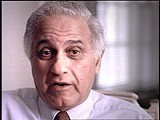You searched for: ���������������������������������������������fuk7778���your
<< Previous | Displaying results 131-140 of 163 for "���������������������������������������������fuk7778���your" | Next >>
-
Rachel Mutterperl Goldfarb describes how partisans obtained weapons from German soldiers
Oral HistoryThe Germans established a ghetto in Dokszyce in late 1941. Rachel hid during the liquidation of the ghetto in 1942, and she and her mother escaped to another ghetto. When the second ghetto was about to be liquidated, they escaped again. Rachel and her mother joined a band of partisans in the forest. She helped her mother to cook, and also cleaned weapons. Rachel and her mother tried to leave Europe when the war ended. They eventually arrived in the United States, in 1947.
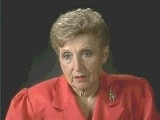
-
Ernest G. Heppner describes the Shanghai ghetto and its Japanese overseer
Oral HistoryErnest's family owned a factory that made matzah, the unleavened bread eaten during Passover. In February 1939, three months after Kristallnacht (the "Night of Broken Glass" pogroms), Ernest and his mother fled to Shanghai, one of few havens for refugees without visas. His father and sister stayed behind in Germany; they perished during the Holocaust. A brother escaped to England. Ernest and his mother found work in Shanghai. In 1947, he came to the United States with his wife, whom he met and married in…
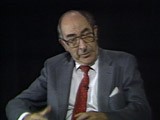
-
Susan Bluman describes fleeing to Vilna after the occupation of Poland
Oral HistorySusan was 19 years old when Germany invaded Poland in September 1939. Her boyfriend, Nathan, was in Lvov when the Soviet Union occupied eastern Poland. Nathan sent a guide to Warsaw to bring Susan to the Soviet zone of occupied Poland. Her parents reluctantly agreed after Susan promised to return to Warsaw within two weeks. Upon her arrival in Lvov, Susan married Nathan. The couple then fled across the Lithuanian border to Vilna, where they stayed for a year. They received a visa for transit through Japan…
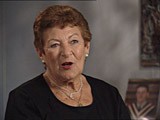
-
Liny Pajgin Yollick describes how hiding their Jewish identity saved her family's life in Nice, France
Oral HistoryIn May 1940, the Germans occupied the Netherlands. In 1942, it took Liny, her mother, and her sister six months to escape to southern France. They pretended to be Protestant, obtained visas to travel through Spain and Portugal, and were on one of the last trains to cross into Spain after the Germans took over southern France. They boarded a Portuguese ship bound for Dutch Guiana (Suriname). Liny was placed in a refugee camp, and then worked in the Dutch embassy in Washington D.C. She eventually settled in…
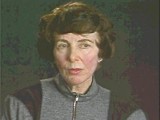
-
Ruth Meyerowitz describes surviving a selection for the gas chamber
Oral HistoryIn Frankfurt, Ruth's family faced intensifying anti-Jewish measures; her father's business was taken over and Ruth's Jewish school was closed. In April 1943, Ruth and her family were deported to Auschwitz. Ruth was selected for forced labor and assigned to work on road repairs. She also worked in the "Kanada" unit, sorting possessions brought into the camp. In November 1944, Ruth was transferred to the Ravensbrueck camp system, in Germany. She was liberated in May 1945, during a death march from the…
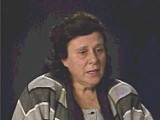
-
Cecilie Klein-Pollack describes mother's actions to save Cecilie's sister's life upon arrival at Auschwitz
Oral HistoryCecilie was the youngest of six children born to a religious, middle-class Jewish family. In 1939, Hungary occupied Cecilie's area of Czechoslovakia. Members of her family were imprisoned. The Germans occupied Hungary in 1944. Cecilie and her family had to move into a ghetto in Huszt and were later deported to Auschwitz. Cecilie and her sister were chosen for forced labor; the rest of her family was gassed upon arrival. Cecilie was transferred to several other camps, where she labored in factories. Allied…
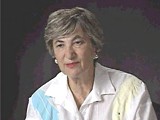
-
Agnes Mandl Adachi describes Raoul Wallenberg's efforts to save Jews from deportation
Oral HistoryAgnes was in Switzerland in 1939 to study French. She returned to Budapest in 1940. After the Germans occupied Hungary in 1944, Agnes was given refuge in the Swedish embassy. She then began to work for Swedish diplomat Raoul Wallenberg in his efforts to save the Jews of Budapest, including the distribution of protective passes (Schutzpaesse). When the Soviets entered Budapest, Agnes decided to go to Romania. After the war, she went to Sweden and Australia before moving to the United States.
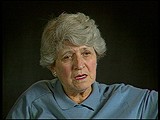
-
Colonel Richard R. Seibel describes food distribution after liberation of the Mauthausen camp
Oral HistoryIn June 1941, Richard was ordered to active duty in the US Army. After a period of training, he was sent to Europe. He entered Austria in April 1945. A patrol came upon the Mauthausen camp and Richard was appointed to take command of the camp. He organized those inmates who had survived in the camp until liberation in May 1945, and brought in two field hospitals. After 35 days in Mauthausen, he was transferred to a post in the Austrian Alps.
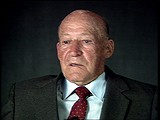
-
US veteran Ross Snowdon describes the camp quarry and barracks and the burial of the dead in Mauthausen
Oral HistoryRoss Snowdon is a veteran of the 11th Armored Division. During the invasion of German-held Austria, in May 1945 the 11th Armored (the "Thunderbolt" division) overran two of the largest Nazi concentration camps in the country: Mauthausen and Gusen.
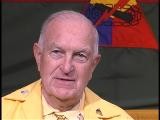
-
Leo Bretholz describes resistance training and activities in a French underground group he joined in 1943
Oral HistoryAfter the Germans annexed Austria in 1938, Leo attempted to flee. He eventually reached Belgium. In 1940 he was deported to the St.-Cyprien camp in France but escaped. In 1942 Leo was smuggled into Switzerland but was arrested and sent back to France, this time to the Rivesaltes and Drancy camps. He and a friend escaped from a train deporting them to Auschwitz in Poland. Leo joined the French underground in 1943. He arrived in the United States in 1947.
